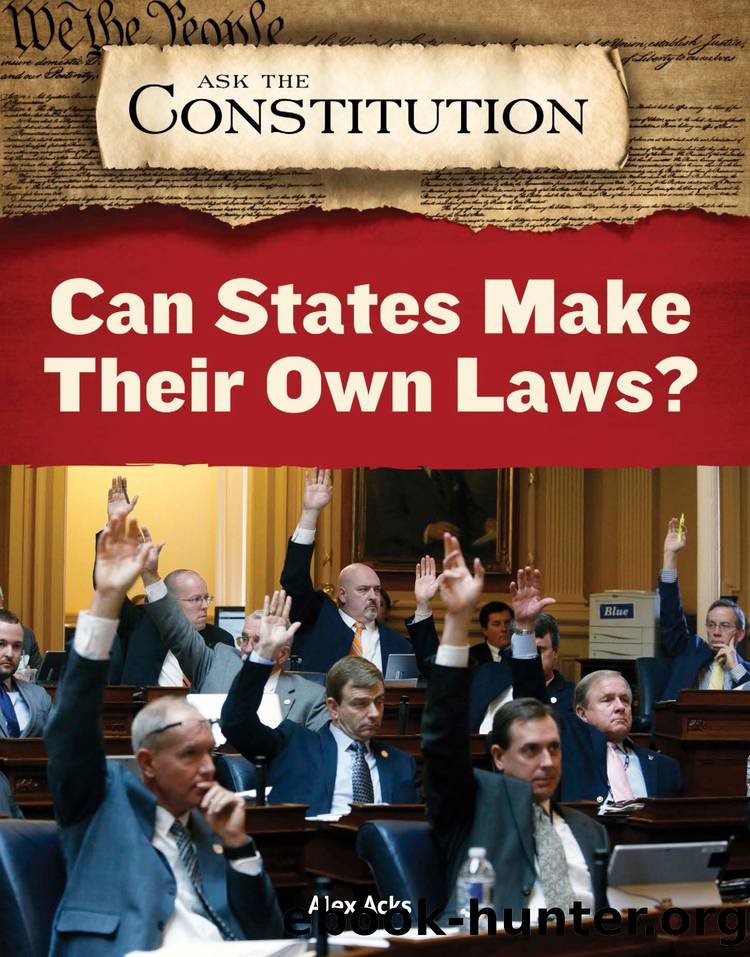Can States Make Their Own Laws? by Acks Alex;

Author:Acks, Alex;
Language: eng
Format: epub
Publisher: Enslow Publishing, LLC
Published: 2019-08-30T00:00:00+00:00
During the Great Depression, unemployed men came to the United States Capitol to appeal for federal aid.
On October 24, 1929, investors began to dump overpriced stock shares, causing the value to drop quickly. This became known as âBlack Thursday.â5 Bank crashes and an economic depression followed, with massive unemployment. The depression continued for years and may have been extended by national economic policies.6
Two and a half years after the Great Depression started, Franklin D. Roosevelt (often called FDR) was selected by the Democratic Party to be their presidential candidate for the election of 1932. In his acceptance speech, FDR said, âI pledge you, I pledge myself, to a new deal for the American people.â7
After his election, FDR worked to make his new deal a reality. He got the Congress to pass two wide-ranging packages of âNew Dealâ bills that included bank reforms, aid packages for business and struggling people, work programs, and controls on things like how much farm goods had to be bought for. Many programs that still exist today like Social Security and unemployment protection came from the New Deal.8
Was the New Deal Constitutional?
Until 1937, the Supreme Court ruled that almost every New Deal law that was challenged by states and businesses was actually unconstitutional. The government tried to argue that the programs fell under the commerce and taxation clauses of the Constitution, but the court felt that those powers did not cover industrial regulation or social and economic reforms.12â14
Sick Chickens Versus the New Deal
Before the âswitch in time that saved the nine,â there was A.L.A. Schechter Poultry Corp. v. United States, also known as the âsick chicken case.â9 Under new regulations created by the National Industrial Recovery Act (NIRA), Schechter Poultry was charged with multiple counts of âthe sale to a butcher of an unfit chicken,â as well as violations of minimum wage laws. The case went all the way to the Supreme Court, which decided that NIRA was an unconstitutional violation of the separation of powers in the Constitution because the regulations were viewed as Congress giving legislative power to the executive branch.10 NIRA was important to the New Deal, and the âsick chicken caseâ was one of the reasons FDR began to look at packing the court as a solution.11
Download
This site does not store any files on its server. We only index and link to content provided by other sites. Please contact the content providers to delete copyright contents if any and email us, we'll remove relevant links or contents immediately.
The Rise and Fall of Senator Joe McCarthy by James Cross Giblin(5281)
Paper Towns by Green John(5191)
The Giant and How He Humbugged America by Jim Murphy(3450)
The Science Book (Big Ideas Simply Explained) by DK(3287)
Eleanor & Park by Rainbow Rowell(3176)
The President Has Been Shot!": The Assassination of John F. Kennedy by Swanson James L(3103)
The Rape Of Nanking by Iris Chang(2824)
Merriam-Webster's Collegiate Thesaurus, Second Edition by Merriam-Webster Inc(2761)
Harry Potter and the Deathly Hallows (7) by J.K. Rowling(2725)
Ancient Worlds by Michael Scott(2689)
Beautiful Oblivion by Jamie McGuire(2608)
Eligible by Curtis Sittenfeld(2586)
Dork Diaries 12 by Rachel Renée Russell(2366)
Sharp Objects by Gillian Flynn(2304)
The Unlikely Pilgrimage of Harold Fry by Rachel Joyce(2273)
Frankly, Frannie by AJ Stern(2210)
The Astronomy Book by DK(2159)
Forensics by Val McDermid(2094)
Who Was Louis Braille? by Margaret Frith(1982)
